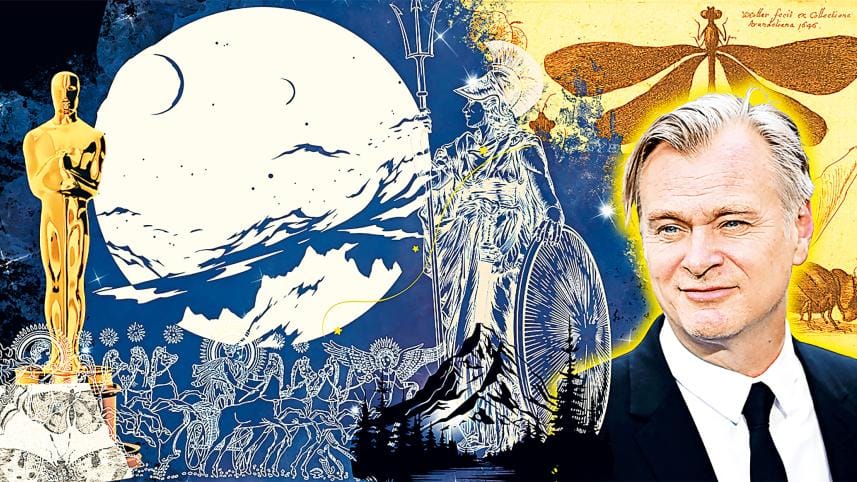Exploring the modern concerns in ‘Homer’s epic’ in light of Nolan’s adaptation

My love for the Percy Jackson series transformed reading The Odyssey from an academic obligation into an act of curiosity. The internal and physical battles, the poetic descriptions, and the vivid imagery sustained this interest. Composed in the late eighth century BC, Homer's epic follows Odysseus as he struggles to return to Ithaca, a journey that takes 10 years after the Trojan War. Meanwhile, his wife Penelope fends off suitors vying for her hand and the throne, while their son Telemachus searches for news of his missing father. Today, this classical mythos has reentered modern discourse as anticipation grows around Christopher Nolan's forthcoming adaptation of The Odyssey (slated for release in 2026), raising questions about whether his reimagining will remain faithful to the heart of the story.
Nolan's style of storytelling is often fragmented, as he explores themes of memory, identity, and the passage of time. This approach resonates with Homer's use of medias res and flashbacks, which bring Odysseus's trials into focus and reestablish his strength as both warrior and strategist. These flashbacks do more than narrate his fall from divine grace; they also evoke the post-traumatic memories of the Trojan War, positioning the epic as a meditation on loss and isolation rather than a straightforward heroic voyage. Similarly, Nolan's films, renowned for their cerebral complexity, often chart the psychological depths of a protagonist across long stretches of time. Yet, as in Homer's epic, intellectual engagement must remain balanced with emotional resonance, which is inseparable from the divine and unseen forces that shape the narrative.
The beauty of The Odyssey lies in the dynamic presence of the Greek gods, who intervene in Odysseus's life while still leaving room for human choice and consequence. Athena's guidance and protection contrast sharply with Poseidon's vengeance, which is provoked when Odysseus blinds his son, Polyphemus. The hero's arrogance in taunting the Cyclops heightens this tension between predestination and free will. A film adaptation that leans too heavily toward mythic determinism or human agency risks collapsing the ambivalence that lies at the core of the story.
This concern extends to Nolan's cinematic techniques. His long runtimes and large-scale format seem well suited to capturing the grandeur of an epic, yet his preference for realism and minimal CGI may undercut the mythical creatures and fantastical landscapes that define The Odyssey. The poem is not only philosophical and intellectual but also a tapestry of imagination, and downplaying its chimerical elements would diminish the folkloric traditions that enrich its narrative.
Beyond imagery, The Odyssey also foregrounds cultural codes such as xenia, or guest-friendship, which functions as a moral test. The Phaeacians' generosity secures their role in Odysseus's safe return, while Polyphemus's cannibalism brands him as uncivilised. Yet, Odysseus's invocation of Zeus to demand hospitality from the Cyclops reflects a colonial mindset, as he projects his own cultural norms as universal truths. A literal translation of this episode risks portraying him less as a clever strategist and more as an ethnocentric figure blinded by hubris.
Equally significant is the portrayal of women in the epic. While figures such as Athena, Calypso, and Circe wield considerable power, mortal women remain confined to the margins of the narrative. Penelope, though praised for her intelligence, is celebrated primarily for her chastity and her role as the faithful wife to be reclaimed by Odysseus. Even her weaving trick to delay the suitors functions as evasion rather than authority, and her true moment of intelligence occurs only within the domestic sphere, when she tests Odysseus's identity. Strikingly, she is entirely absent from the climactic battle, comically asleep while violence unfolds around her. Nolan's history of underdeveloped female characters raises the question of whether he will reinforce this masculine focus, reducing women to passive figures or objects of voyeuristic pleasure.
Ultimately, The Odyssey is not solely the story of Odysseus. Its epic quality emerges from the breadth of its poetry, shaped by an omniscient narrator and multiple perspectives. While Homer's structural devices align closely with Nolan's stylistic techniques, the filmmaker's treatment of the epic's philosophical, religious, and mythical dimensions will determine whether his adaptation succeeds in honoring the spirit of the poem or reduces it to a spectacle stripped of its depth.
Zarin Junainah Anam is an English Literature major and a day-dreamer. She also writes at Cha-time with Junta on Substack because life's always better with a little drama, a little bit of sarcasm, and far too many cups of tea.



 For all latest news, follow The Daily Star's Google News channel.
For all latest news, follow The Daily Star's Google News channel.
Comments